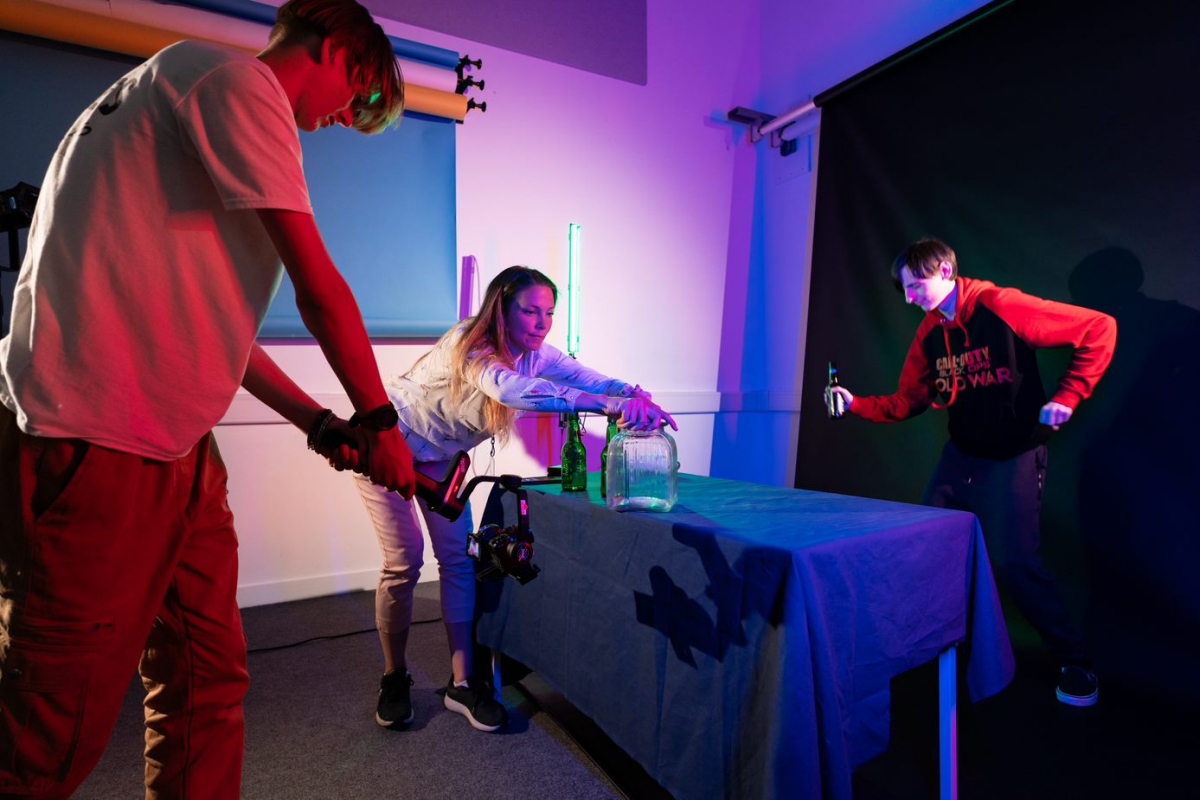A Level Media Studies
The media play a central role in contemporary culture, society and politics. They shape our perceptions of the world through the representations, ideas and points of view they offer. The media have real relevance and importance in our lives today, providing us with ways to communicate, with forms of cultural expression and the ability to participate in key aspects of society. The economic importance of the media is also unquestionable. The media industries employ large numbers of people worldwide and generate significant global profit. The globalised nature of the contemporary media, ongoing technological developments and more opportunities to interact with the media suggest their centrality in contemporary life can only increase.
Key information
Media, Photography & Games / Full Time / A Levels and Equivalent

Why choose this course?
During your study of Media Studies you will develop a thorough and in depth understanding of these key issues, using key concepts and a variety of critical perspectives to support critical exploration and reflection, analysis and debate. You will study of a wide range of rich and stimulating media products which will offer opportunities for detailed analysis of how the media communicate meanings in a variety of forms. Working from the product outwards you will debate key critical questions related to the social, cultural and economic relevance and impact of the media. Through studying media products holistically in relation to all key concepts, you will engage with the dynamic relationships between media products, media industries and audiences. You will also consider established media forms alongside more contemporary forms, developing an awareness of the relationship between media forms and online platforms.
Although the primary emphasis in this specification is on the contemporary media, you will explore how the products relate to their wider historical contexts, extending your experience of the media through the study of products with which you may be less familiar, including those produced by or for a minority group, non-mainstream and non-English language products. This aims to develop your knowledge and understanding of the transnational nature of the media, considering the effect of different national contexts on representations in media products, the global reach of media industries, and the targeting of audiences on a national and global scale.
Media studies is not about watching films and reading newspapers, it is about actively engaging with media practice and production, social & cultural theory and critical thinking. This course will enhance your enjoyment and appreciation of the media and its role in your daily life by providing you with the ability to deconstruct, analyse, evaluate and create media texts. You will study the way media - TV, Radio, Film, News, Music, Publishing, Social Media, Advertising, Games - are constructed through technical, visual and audio codes to better understand the powerful and complex messages we receive as an audience.
You will also explore production processes and develop skills in photography and layout and design, using programmes such as Adobe Photoshop and InDesign, when producing your own print products. In the second year you will develop web and film skills.
Drawing on the best academic traditions from the arts, humanities and social sciences whilst incorporating practical vocational skills, A Level Media Studies offers a challenging and exciting course of study that will enable you to develop skills and knowledge that are crucially important to our contemporary world.
What will I learn?
The A Level is a two-year programme consisting of:
Component 1: Media products, industry and audience – exam (35% of overall AS mark)
Component 2: Investigating Media Forms and Products in depth - exam (35% of overall AS mark)
Component 3: Cross-Media Production - non exam assessment (30% of AS mark)
You will cover a broad range of media through both theoretical and practical modules. You will produce a front cover and double page spread for your own magazine design based on your own research into existing products. Instruction is given in journalistic skills such as interviewing techniques as well as technical skills in Photoshop and In-design. Other options include filming a TV sequence or music video. Marks are awarded for research skills, technical ability and self-evaluation. The examination modules include textual analysis of unseen media texts, as well as the analysis of set texts in relation to media language, representation, media industries and audiences. You will also study three media forms in depth: magazine, online and TV.
Assessment arrangements
You will take two written examinations in June of the second year each worth 35% of the qualification. The final component is a cross-media coursework production, worth 30% of the course.
Information & Support
We encourage all students to read/view widely and conduct their own research into Media and Film, especially those who wish to study Media or Film at degree level. We expect you to actively engage with the online resources such as Sharepoint, eStream, Scoop, It & Twitter as well as relevant course textbooks.
Where will it take me?
A qualification in Media Studies is highly valued by many universities and employers alike. Media Studies is also an excellent subject to complement many courses, such as Film Studies, English, Psychology, Sociology, Photography, Art and Design.
What will I need?
Five GCSEs at grade 4 or above including English Language or Literature at grade 5 or above.
Additional Information
Awarding Body:
WJEC/EDUQAS
Other courses of interest:
A Level Film Studies
A Level Photography
To obtain more information about this course, please call: 01208 224000 or email enquiry@callywith.ac.uk



